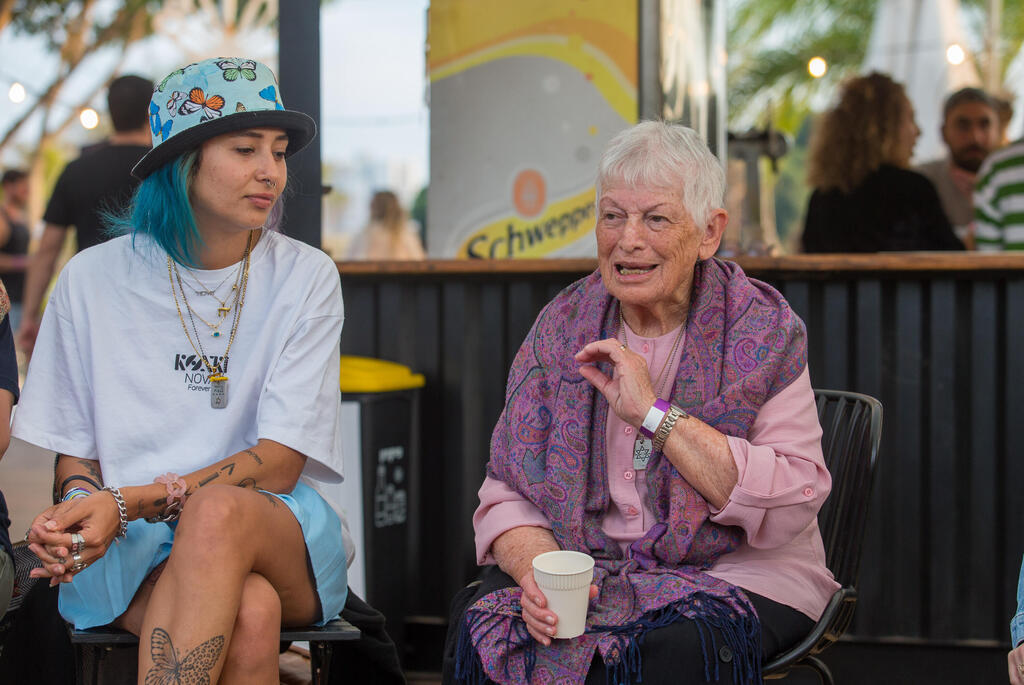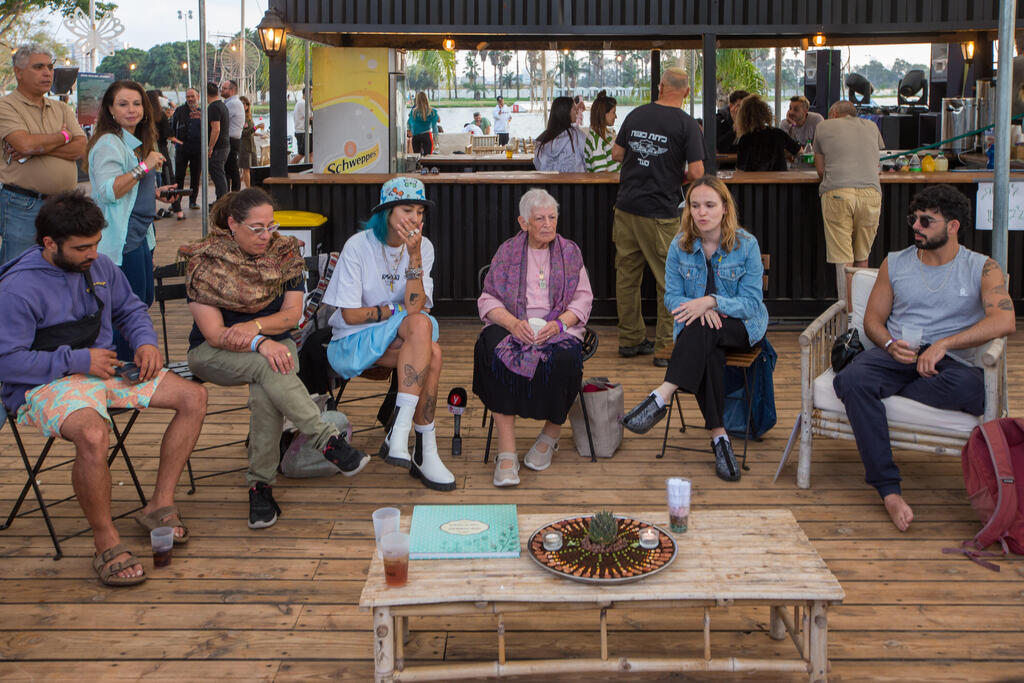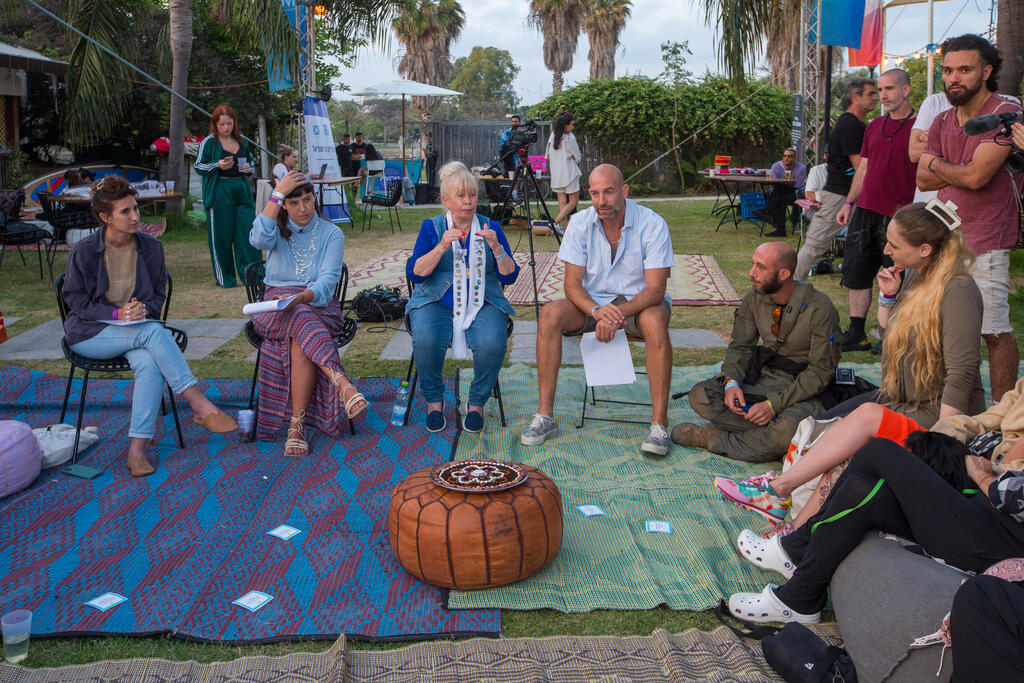"Anyone who survived the Holocaust and managed to rebuild their lives is a symbol and an example for the survivors of the massacre to choose life." This statement resonated on Wednesday with many who lived through the brutal events of October 7, the gravest attack on the Jewish people since the Holocaust. Survivors gathered for an uplifting evening where Holocaust survivors lent their support and shared their resilience.
The gathering took place beside a lake in Tel Aviv, just before Holocaust Remembrance Day, which will be observed next week. The event featured three circles of conversation where Holocaust survivors met face-to-face with those who survived the recent tragedy. Each Holocaust survivor narrated their personal saga, reinforcing the idea that one can indeed "choose life."
In one poignant circle, Sarah Jackson, an 88-year-old resident of Kibbutz Sa'ad and a mother to seven, grandmother and great-grandmother, shared her space with Lelah Levi, a 27-year-old from Tel Aviv, who survived the October onslaught on the Nova music festival and found shelter from terrorists in Jackson's home.
Levi clasped Jackson's hand, her eyes filled with admiration and affection. She expressed her deep gratitude, saying, "This amazing woman saved our lives when we fled from the massacre and hid in her safe room in Kibbutz Sa'ad until the afternoon."
Sarah looked a bit embarrassed by all the praise Lelah was giving her. On the morning of the massacre, Lelah and four others arrived at Sarah's house and hid in the safe room. Sarah tried to comfort them and make them feel safe after their terrifying escape from the festival, where hundreds were killed, wounded or kidnapped.
Sarah recalled the morning of Simchat Torah: "I woke up early to go to the synagogue, and then one siren after another started. I stepped outside and before I knew it, I saw a group of young people. Four boys and Lelah, who had escaped from the massacre, rushed into my house and locked the door. They even pushed a heavy chair against it.
"I was confused; I hadn't heard about the massacre yet. We went into the safe room. They had grabbed knives from the kitchen and were very shaken. I tried to share my own survival story to calm them, but they weren't ready to listen, so I just gave them space. By 3:30, we left the safe room. I showed them a back way out, and they went back to their homes."
In their discussion, Lelah told her friends, "Sarah shows us that it's possible to move forward and choose life." Sarah added, "After all I've been through, I chose to love life and that's what I encouraged them to do—to love life and not dwell on the massacre."
At 88, Dvorah Weinstein from Herzliya joined a discussion group with the Nova massacre survivors. She explained that the goal of the session was not just to mourn the horrific events at Nova, but to look ahead and work toward recovery.
She urged those who were still in shock and silent, "Start talking about what you went through. Create a lasting memory. Let everyone born in this country understand what happened. 'Never again'."
Weinstein expressed her shock about the oversight that led to the tragedy. "I couldn't believe that in my country, the strongest in the world, such a thing could happen at Nova—but I'm telling you, we need to recover," she said, calling for a significant political change.
"We need to replace the leaders who don't accept responsibility. It's time for a younger generation that will truly serve us."
Naama Shmulevitz, who leads the Nova community association, said, "Since the tragedy, we've come together—families of the deceased, survivors, organizers, and attendees, all united with a mission to maintain the spirit of the Nova community and provide support. Holocaust survivors, with their profound experiences of rebuilding life, serve as symbols and guides for the Nova survivors to choose life. Their resilience offers unique insights and strength to those affected by the Nova event."
During the Holocaust, Jackson and her family had to constantly move as a child in Poland, relying on brave people who risked their safety to hide them.
Weinstein was born in Khotyn, a small town in Soviet Ukraine, to a seamstress and a cart driver. The summer of 1941 brought a significant change when the area fell under German control and her father was drafted into the Red Army. Forced to flee their home, Dvorah, her mother and sister faced harsh weather as they joined other Jews on a difficult journey.
Despite their solidarity, many suffered from violence, illness, fatigue and hunger. Their journey included crossing icy rivers and trudging through snow, a six-month ordeal during which Dvorah lost her sister.
Eventually, Dvorah and her mother wandered across Europe until they were finally reunited with her wounded father after the Battle of Stalingrad. In 1948, Dvorah managed to migrate to Israel, with her parents joining her three years later.
Hannah Geffen, who also attended the meeting, was born in 1935 in Biala Rawska, central Poland. When the local ghetto was established in late 1941, Hannah's family was initially allowed to live just outside its boundaries due to her mother's job as a seamstress for the German occupiers.
Hannah was briefly placed with a Polish foster family but soon returned to her parents, who were hiding in an underground potato pit. By the end of the year, the Jewish community in her town was sent to the Treblinka death camp. With the help of a neighbor, Hannah and her mother obtained forged documents. Hannah's father was separated from them, and his fate remains unknown.
The two spent the rest of the war hiding in a Warsaw apartment. After enduring many hardships, they returned to their hometown after the war, only to discover they were the last surviving members of their family. In January 1949, Hannah made Aliyah and has lived in Tel Aviv ever since.





